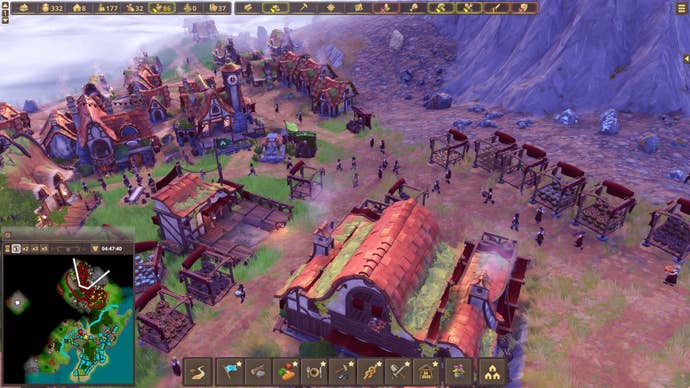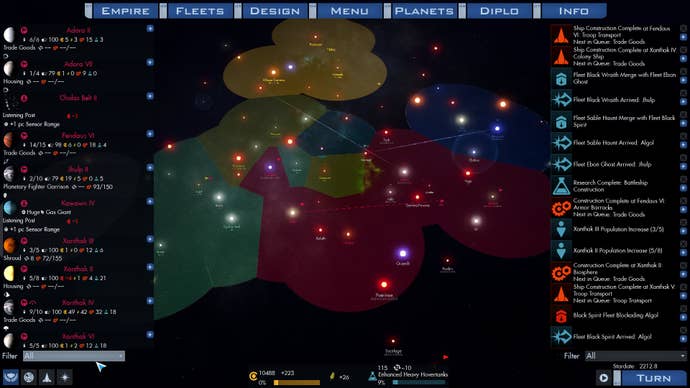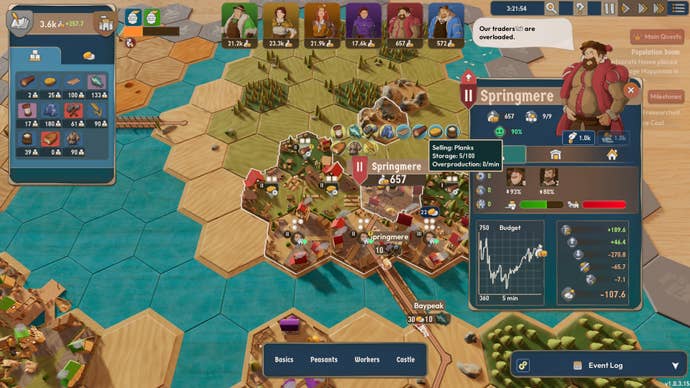Sometimes, readers, it’s tempting to do the popularity thing, and ask what you’re playing, or thinking of buying. There are countless popular games I never mention, surely I should be doing those? What if I am terrible actually and should write about the things that are making a big splash instead?
But that way lies Views Brain. You can already get that everywhere. Moreover, I suffer a curse where if you chose a game I hated or found dull, it would ruin my life. Especially given the time investment that even lightweight strategy games so readily demand (I don’t get paid for the 6-hours-in “Oh, this is really limited/bugged/regurgitated” games, you know).
My compromise was a shortlist you could pick from, and I’d do a piece on the winner. Naturally I’d have to play them a bit first to be sure, and you already know what happened, don’t you. We’re doing a roundup, and it won’t be the last. There are no rules in the Rally Point.
Pioneers of Pagonia

Finally I can play this, since learning that, with many clicks, you can in fact minimise the inventory bar at the top of the screen, which had previously driven me too insane to play for long. And yes, I know you can “minimise” it. That was still very distracting. But hey, that’s the worst thing I can say so far.
Though influenced by The Settlers, Pioneers of Pagonia eschews the ancient hexevial way, making buildings and roads freeform instead. It is, however, still all about the roads determining how resources are carried – through your design, not instruction. It’s a very solid drip of the increasingly familiar “wuselfaktor”: lots of little people bustling about in a way that’s enjoyable even just to watch.
Production is quite complex, but somewhat intuitive and aided by a strong UI’s tendency to tell you where you need to look if a building isn’t doing what you need. Managing population is both a huge part of the game and an undemanding one, as generalist individuals (carriers, pioneers) convert into specialists (miner, guard, smith etc.) at the proper buildings when required. Each wee person visibly is one thing or another, rather than a generic framework for skills, to be shoved back and forth from job to job. Partly this is because it’s skipped Banished, and “survival” entirely, since food is a supply for specific jobs rather than a meter to tediously supervise. It makes everyone easier to manage at a glance, since population grows fast and doesn’t collapse the instant you have 23 grain instead of 26. If you need more miners, just order some, and your people will take care of it. Better soldiers need particular equipment, which needs different resources, but this is largely about layout and logistics, not numbers.
Manufacture and training buildings automatically co-operate, too. A rodless fisherman won’t just watch the idle, codless toolmaker starve because you didn’t intervene. They’ll produce what’s needed, as and when, and only stockpile if you ask for it, so you won’t have to face shortages or glower at 20 redundant pickaxes. It’s a different approach and ultimately game to Widelands, the other game that gets it, but there’s very much a shared ethos of setting your people up to handle things themselves.
This is necessary too, since the exact order in which you’ll need specific tools, buildings, or ores is relatively complex. Pagonia is such a joy to play, though, that it feels like an inviting complexity that you’re subtly guided through, rather than Banished’s punishing survivalism or the overwhelming pedantry of a W&R. Also, when there’s combat, it’s all little duellists running at each other going “YAAAARGGH”. And sometimes a bandit will steal a bucket of water. You can HAVE water, oh my god.
Lord of Rigel

Lord of Rigel is a clear love letter to Master of Orion with a hint of Master of Orion 3 (which is not the insult it may sound like). I had to look up whether there was a fourth or I was confusing it with Star Control, which perhaps unfairly summarises the impact it made. This one may have cursed itself with such a high bar. A very slow start builds to an enjoyable and slightly offbeat space 4X with far less micromanagement than its idol, but the cracks began to show as neighbours with perfect relations kept accusing me of threatening them by having two cruisers at my own capital, and its main plot kicked off without warning, causing everyone to declare war on me without explanation.
I appreciate its look, especially the brief cutscenes when a colony is founded or space amoeba rolls up. Most novel is research, which offers dozens of fields (some hidden until a prerequisite field is done) with three techs each, two of which are blocked off once you pick. You can, however, pick up the others through trade, espionage, or occasionally hiring a character who offers it (an absurdly good deal). Techs are very varied even within each field, making the decision feel like more than just a build order, and making faction specialties feel more impactful. But… I don’t know. It’s fun, and impressive for a tiny dev, but they’ve bitten off more than they can chew without big name money. Fair play to them for the regular updates, though.
Citystate 2

I regret making this a mere aside. Despite its limitations, a few years ago I fell into a pattern of occasionally playing Citystate 2 for a day or two and stopping, satisfied, whereas its peers would and continue to bore me, devour my time, and expel regret. It’s a strikingly pretty game, and I appreciate now that yes, its political options largely come down to nudging statistics up or down, but that’s more than most SimCity descendants attempt. And it allows for goals like “Ban private banks, private schools, the stock market, religion, and fucking smartphones”, even if there’s no fanfare and the only reward is cooing at the thing you built.
A few parts are half baked. Awkwardly, you can’t place anything without placing a connecting road first, and there aren’t enough summaries or overlays for things like public transport. But Citystate’s main idea is that instead of one ultra-city, the world map is a single nation, and each square a separate city. So you can build a new one for a few nights, then consider it done and try something else, still within the same game. The other cities enter stasis, and the links don’t really work. But I’ve grown fond of it, and it’s very telling that despite it predating Skylines 2 by several years, it’s no contest which I keep going back to.
Also, there is no truth to the rumours that the great skyscraper fire was caused by my getting distracted and crashing my helicopter into it. Shut up and take your mandatory pills, citizen.
Let Them Trade

Do not be fooled by its bright and approachable appearance. Let Them Trade is a complex economic simulation in a way I can’t recall seeing before, with more moving parts and significant details than you’d ever guess.
But it’s not a survival game either. I don’t think there’s any hard fail state, as messing up badly enough merely slows things down. Even the optional bandits are no existential threat: they live to rob merchants, not murder everyone for no reason.
I got out of one mess, where everything had come to a halt through a lumber shortage, by… demolishing the entire lumber town and building a new one elsewhere with access to more forests. You can do badly and face consequences, but it’s not interested in punishing you.
You place towns, then building hexes. These do not add wood or tools or whatever to your pile. They add them to that town’s stores. Build second, third, seventh villages, and the first one will export what it’s produced to them, for money. Your money comes from tax on those transactions. Each town has its own treasury, and manages business independently. The more self-sufficient a town is, the less it profits you, and building space is limited. There’s a dynamic market system too, so scarce items become absurdly costly, and a single-resource town could suddenly decline when you build another source.
You’ll need to do that though, since purchasing towns must send a cart to the seller with the money (hence, bandits) and back, which takes time and a cart. Plus, a town heaping up money is less than ideal; it’s a trade imbalance, money not being spent on building or supplying someone.
Over time, research (burning goods automatically bought at market price, or manually if you planned ahead) provides new buildings, resources, and worker types, and everything becomes more complex. Upgrades enable redevelopment by condensing housing, or improved efficiency if a new resource is imported, often with multiple options.
Let Them Trade’s great strength is that the reward for planning well isn’t mere survival. It’s the satisfaction of a smooth operation in motion. The Settlers naturally comes to mind, but this is a much friendlier game. I love the touches of personality, like the knights’ jointed wooden horses, and each town’s different colour and mayor, whose dialogue changes depending on their town’s circumstances. Or the secret cat.
It’s a very impressive balancing act, more substantial than its lightweight aesthetic suggests, but not chewy enough to be exhausting. You won’t play forever, but who has forever?